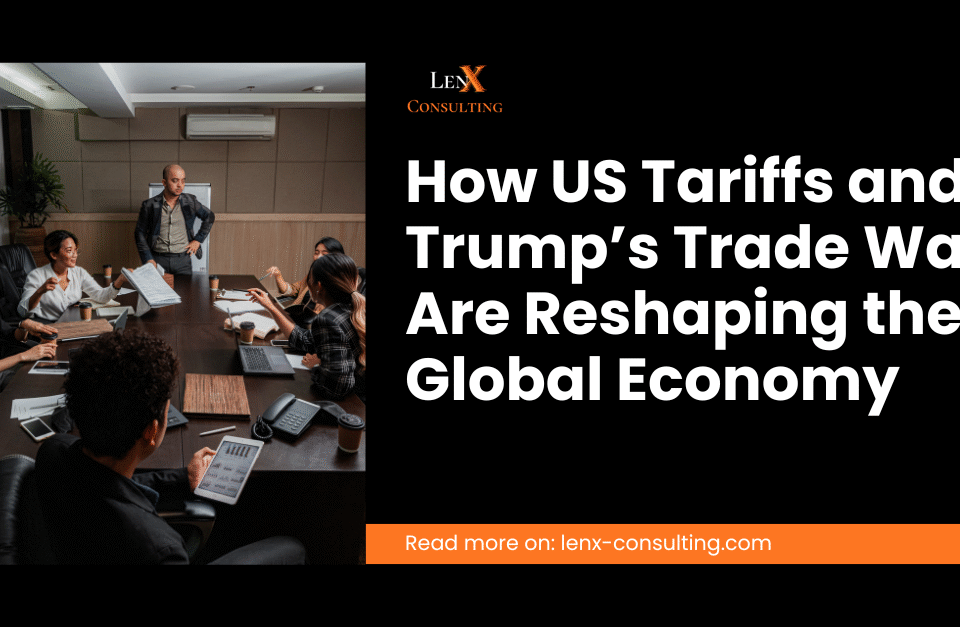Global Trade Disrupted by US Tariffs
As you will all know by now, the tariffs, announced by President Donald Trump, include a 10% minimum tariff on most goods imported to the US, with a higher 20% rate for the European Union. This move has caused significant concern among global markets, with European Commission President Ursula von der Leyen calling it a “major blow to the world economy”.
In response, the EU is preparing countermeasures to protect its interests and businesses if negotiations with the US fail. Meanwhile, Asian economies, including China, Japan, South Korea, and Vietnam, are facing some of the steepest duties and are also considering retaliatory measures, increasing trade tensions.
The UK has expressed its desire to maintain a strong trading relationship with the US despite the tariffs. However, there are growing concerns about the potential impact on UK businesses and the broader global economy.
Shifting Trade Relationships and Economic Fallout
Global trade relationships are shifting significantly in response to the latest tariffs. The US tariffs on imports, particularly targeting semiconductors, steel, and agricultural products, have led to retaliatory measures from affected trading partners. Countries like China, the EU, and India are adjusting their trade strategies, either by imposing reciprocal tariffs or seeking alternative markets.
The EU and UK are actively exploring closer trade ties with Asia, aiming to mitigate the impact and diversify their economic partnerships. Meanwhile, the Trump administration has signalled a broader re-examination of global trade frameworks, including multilateral agreements like the WTO and Bretton Woods system. Experts argue that these tariffs may violate WTO rules, potentially leading to disputes.
The obvious economic consequences are that businesses are facing higher costs, which could lead to inflation and reduced investment.
Tariffs have profound long-term effects on global trade, shaping economic policies, trade alliances, and market dynamics. They increase the cost of imported goods, leading to higher prices for consumers and businesses. The countries affected by tariffs often seek alternative trade partners, leading to shifts in global supply chains, while prolonged tariff wars can reduce trade volumes, slow economic growth, and create uncertainty in financial markets.
Some domestic industries may benefit from reduced foreign competition, but inefficiencies can arise due to lack of competition.
Strategic Collaboration and Supply Chain Resilience
There’s no escaping the fact that the US tariffs have sent shockwaves through global trade and it has prompted businesses across Asia, the UK, and the EU to rethink their strategies. Here’s some thoughts on how they could collaborate to mitigate the impact:
- Strengthening Regional Trade Agreements: The UK and EU could deepen trade ties with Asian economies to offset losses from US markets. Expanding agreements like the Comprehensive and Progressive Agreement for Trans-Pacific Partnership (CPTPP) could be a strategic move.
- Diversifying Supply Chains: Businesses can reduce reliance on US imports by sourcing raw materials and components from within Asia and Europe, fostering resilience against trade disruptions.
- Joint Investment in Manufacturing: Establishing shared production hubs in tariff-friendly regions could help businesses maintain competitive pricing and avoid excessive duties.
- Leveraging Digital Trade: Strengthening e-commerce and digital trade partnerships can help businesses bypass traditional tariff barriers and tap into new consumer bases.
- Coordinated Lobbying Efforts: Governments and business leaders could work together to negotiate better trade terms with the US or push for tariff exemptions.
The tariffs are expected to hit industries like automotive and technology particularly hard. By joining forces, businesses can navigate these challenges more effectively and maintain stability in global markets.
Managing Risks and Turning Disruption into Opportunity
Certainly, prioritising supply chain resilience is a most viable strategy. According to industry experts, companies are shifting towards diversification and nearshoring to mitigate risks.
Some industries, particularly electronics, are building up reserves to delay the impact of tariffs while reassessing long-term strategies and companies are moving production closer to home or to tariff-friendly regions to maintain cost efficiency. Firms are running extensive cost-impact analyses to determine the best sourcing and pricing strategies and these approaches help businesses maintain stability while navigating the evolving trade landscape.
Each strategy comes with its own set of risks that businesses should carefully consider. Diversifying suppliers reduces dependency on a single source, but it can lead to quality inconsistencies, higher management costs, and logistical complexities. Holding excess stock can result in storage costs, product obsolescence, and cash flow constraints, especially if demand fluctuates. Moving production closer to home can lead to higher labour costs, limited supplier availability, and geopolitical risks.
Balancing these risks with potential benefits is key to making informed decisions.
However, where there’s disruption, there’s also opportunity and businesses in these regions can strategically launch and adapt to the new conditions.
For example, the UK exported £60.4 billion worth of goods to the US in 2023. With a 10% tariff now in place, UK businesses could expand trade with Europe and Asia to offset losses. Investing in local manufacturing and consumer markets can also help businesses reduce reliance on US exports. The UK government is negotiating an economic prosperity deal to mitigate the impact and businesses should engage with policymakers to shape trade responses.
In the EU, they face a higher tariff, making exports to the US significantly more expensive. Businesses should focus on intra-EU trade and strengthen ties with Asian markets. European firms can differentiate through technology and sustainability, making their products more competitive despite tariffs. The EU may retaliate with its own tariffs, but businesses should push for bilateral trade deals with other regions.
As for Asian businesses, some of whom are facing tariffs over 50%, they could relocate production to tariff-friendly regions and expand regional trade to reduce dependence on US markets. Countries like China, Vietnam, and Cambodia are also expected to introduce stimulus measures to counteract the economic hit.
For good or bad, the global trade landscape is shifting, and businesses must adapt quickly. Whether through regional expansion, innovation, or policy engagement, companies can turn challenges into opportunities.
Strategic Expansion with LenX Consulting: Bridging the EU, UK, and Asia
Here at LenX consulting, we have been advocating this tighter unity between the EU, UK and Asia for some time.
Vietnam: The Next China – Why It’s the Perfect Market for Your Brand Expansion
Cracking the Code: How to Make Your Brand Resonate in Global Markets
Marketing Asia to Europe: Strategies for Successful Market Entry
LenX Consulting is a trusted partner for businesses aiming to expand into new markets. With deep expertise in marketing, business development, web solutions, and brand strategy, LenX Consulting helps companies navigate the complexities of global growth.
How LenX Consulting Supports Global Business Growth
- Market Entry Strategies: Custom expansion plans designed to streamline entry into new regions and reduce go-to-market risk.
- Brand Positioning: Strategic design and marketing approaches that elevate brand visibility and competitiveness.
- Technology & Innovation: Advanced digital tools and solutions that enhance customer engagement and operational efficiency.
- Global Reach: Deep regional expertise across Europe and Asia to navigate diverse business landscapes.
Looking to explore specific industries or regional opportunities? Let’s refine the results-driven expansion strategy with Lenx Consulting!







